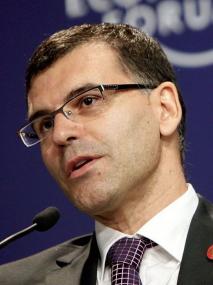Inside the Euro Crisis
23 June 2014 5:00 pm CEST
Simeon Djankov, New Economic School Russia
Venue
wiiw, Rahlgasse 3, 1060 Vienna, lecture hall
Description
The problems inherent in the Eurozone formation were foreseen by many economic experts over the years. But when the Eurozone sovereign debt and banking crisis engulfed the region in 2010, the policy response was often chaotic, short-sighted and hampered by political and ideological constraints. By now, the euro area has stabilized, but many of the long-term problems remain. As it is made clear in Djankov’s book Inside the Euro Crisis: An Eyewitness Account, the costs of the crisis were higher than needed, and the Eurozone is far from out of danger. Inside the Euro Crisis offers some important suggestions for repairing the damage and minimizing the chances of crises in the future. More than that, it tells a dramatic story of one individual economist’s experience as part of the high-level decision making process in Brussels as the crisis unfolded.
Simeon Djankov is Rector of the New Economic School in Russia and a visiting lecturer at Harvard University's Kennedy School of Government and visiting fellow at the Peterson Institute for International Economics. He was deputy prime minister and minister of finance of Bulgaria from 2009 to 2013. In this capacity, he represented his country at the Ecofin meetings of finance ministers in Brussels. Prior to his cabinet appointment, Djankov was chief economist of the finance and private sector vice presidency of the World Bank. In his 14 years at the Bank, he worked on regional trade agreements in North Africa, enterprise restructuring and privatization in transition economies, corporate governance in East Asia, and regulatory reforms around the world. He is the founder of the World Bank's Doing Business project. He is author of Inside the Euro Crisis: An Eyewitness Account (forthcoming, 2014) and principal author of the World Development Report 2002. He was associate editor of the Journal of Comparative Economics from 2004 to 2009 and chairman of the Board of the European Bank for Reconstruction and Development in 2012–13. He is also a member of the Knowledge and Advisory Council at the World Bank. He has published over 70 articles in professional journals. He obtained his doctorate in economics in 1997 from the University of Michigan at Ann Arbor.
